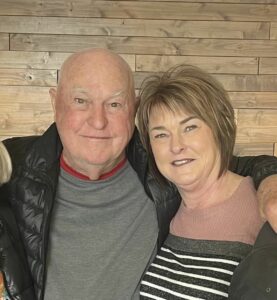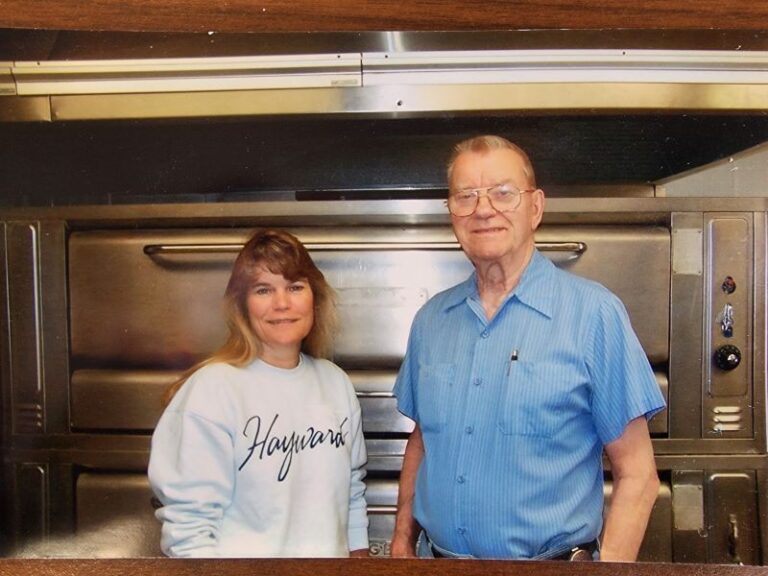
Sales and Public Relations Director at Edgewood in Minot, Shannon Conroy, has helped seniors and their families find peace of mind through senior living services for 25 years. Recently, Shannon faced an eye-opening experience with her own father, Don, which deepened her understanding of the importance of healthcare advocacy.
By sharing her family’s journey, Shannon hopes to inspire others to become strong advocates for their loved ones’ healthcare, regardless of age. Her story highlights the importance of speaking up to ensure the best care and support for those we hold dear.
Shannon & Don’s Story
Shannon’s father, Don, is age 86 and lives at Edgewood in Minot. Before that, he’d lived independently in Arizona. When his health declined, he opted to move closer to his family in North Dakota. By moving, he could have support to maintain his independence.
After a series of falls, significant cognitive changes, and a trip to the ER, Don was diagnosed with a concussion and dementia. However, his symptoms and their quick onset from October 2023 to April 2024 didn’t feel quite right based on Shannon’s previous experience working with those who have dementia.
Shannon felt like her dad’s symptoms came on very quickly. Just last year, he was living independently, and not long before that, he led a very active lifestyle, playing pickleball, golfing, and throwing horseshoes.
Continued Outreach & Advocacy
Shannon and her siblings asked healthcare providers for their dad to have further testing and see a neurologist to obtain an accurate diagnosis once his symptoms escalated. Thank goodness that they did! A CT scan revealed that Don had fluid around his brain. Shannon, her dad, and her siblings consulted with a helpful neurologist, who ordered an MRI to learn more, which led to a spinal tap to drain the fluid.
From there, Don ended up having a shunt placed to drain the fluid from his brain. His diagnosis went from what they thought could be irreversible dementia to Normal Pressure Hydrocephalus or NPH.
Since recovering from his procedure, Don has returned to his old self. He’s living independently at Edgewood Assisted Living in Minot. Shannon shared that he’s gone from being unable to respond in an almost catatonic-like state to socializing and managing his own financial affairs!
Don and his family are unbelievably grateful that he had the proper testing and that the treatment worked to give him his life back. They want more families to know about NPH and the importance of an accurate and timely diagnosis. Shannon explained that finding the root cause matters. Even if the result is a grim prognosis, knowing the cause directs families to find the proper support and treatment plan. She said, “No matter their age, they deserve a good quality of life.”
What is Normal Pressure Hydrocephalus/NPH?
According to the Alzheimer’s Association, NPH is a brain disorder that causes excess cerebrospinal fluid to build up inside the brain’s ventricles. The excess fluid presses on the brain’s tissues and causes symptoms like urinary incontinence, memory loss, and difficulty walking.
Unfortunately, those symptoms can be misdiagnosed as Alzheimer’s or Parkinson’s, which are irreversible forms of dementia. NPH can also occur along with these forms of dementia, further complicating diagnosis and treatment.
About NPH
- NPH is a cause of dementia that can be controlled and even reversed with treatment. (Outcomes and treatments will differ for each patient).
- The Hydrocephalus Association estimates that as many as 800,000 older Americans may be living with NPH, AND 80% of cases may be unrecognized or treated.
- Without adequate testing, those with NPH may be misdiagnosed with Alzheimer’s disease, Parkinson’s disease, stroke, or other conditions.
- It typically impacts people in their 60s and 70s.
- There are two forms: primary and secondary NPH.
- Primary NPH means it’s not happening due to any other medical condition.
- Secondary NPH means NPH is happening for another reason. (A stroke, TBI, head injury, brain tumor, brain aneurysm, or an infection such as meningitis or encephalitis).
Diagnosing NPH
- Physical and neurological exams
- Medical history
- MRI & CT scans
- Lab Tests (Spinal tap to test fluid)
Tips for Navigating the Doctor’s Office
Remembering what to share during a doctor’s visit can be difficult. Bring notes with you to help support conversations! They could be the missing link to learning the root cause of symptoms and the timeline.
It is important to see the doctor sooner rather than later. Because neurological conditions may have a slower onset, it can be difficult to pinpoint which symptoms started when.
Just like bringing notes, asking the doctor questions is also acceptable. A patient’s age should never prevent them from receiving quality medical care, testing, and an accurate diagnosis. Shannon advised, “Trust your gut and get a second opinion if you need one.”
Although cures may not be available for every disease, quality of life is still possible with the right plan of care. Shannon and her family are incredibly thankful for Don’s neurology team in what feels like a second chance at life for their dad. “I wake up every day feeling like a kid at Christmas,” Shannon remarked.
If you’re looking for services like memory care support or a senior living community with healthcare providers on-site, contact us at info@edgewoodhealthcare.com.




